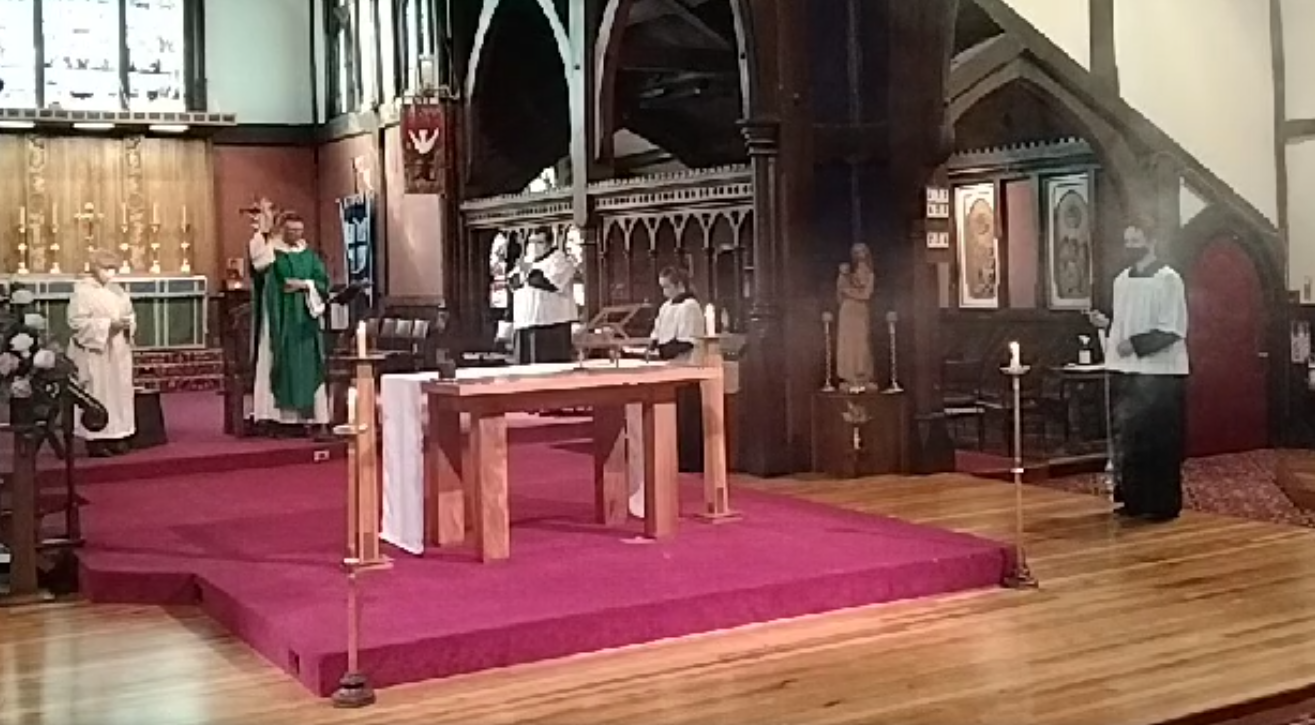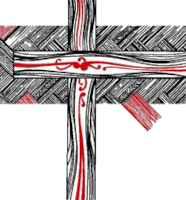Fr Bosco Peters presided and preached at the 11am mass. Our Gospel reading was taken from Luke 14: 25-33.
Read on for the sermon and a video of the service.
Service Video
Audio for this video is not working with the Safari browser or on iOS devices (iPhone and iPad).
Sermon
So - large crowds are travelling with Jesus, and what does Jesus do? Does he turn to them and say: hey, it's great to have you all here, wonderful that there's so many of you.
No. Jesus turns and says: hate your father and mother, hate your spouse, your children, siblings, and your life. Carry your cross. Give up all your possessions. Encouraging to the crowds? Not!
Some people in sermons today will try and soften Jesus' language - they'll say that Jesus actually meant: "Whoever loves father or mother more than me is not worthy of me; and whoever loves son or daughter more than me is not worthy of me." That's what it says in Matthew's Gospel - but, sorry people, that's not what it says in Luke's Gospel here today. It's μισεῖ (misei) - hate here today in Luke.
And we hear this hate your father in NZ on Father’s Day - the first Sunday in September.
Celebrating Father's Day is fraught enough already. Sure, many - let's hope most of us - have or had a good relationship with our father. But there are many whose dad was not how fathers should be - to the point where the metaphor of God as father is a painful, challenging, and triggering one. Then there are fathers who struggle with being a dad. And there are those who would love to be a dad and for a variety of reasons are not and even cannot be a dad. And so on.
Now, the readings we read here in Church are a worldwide ecumenical agreement - so today all around the world, Anglicans in Singapore, Roman Catholics in Brazil, Presbyterians in USA, Methodists in Auckland, everyone is reading these same readings. It's called following the lectionary.
And I've done the calculation - I've got a maths degree and I'm not afraid to use it - about a fifth of the time on Father’s Day in NZ we read this particular hate-your-father reading.
Following the lectionary is important. Following the lectionary means we meet texts that are uncomfortable, as we have today; we end up reading in church parts of the Bible that we would not choose.
So - give up all your possessions, Jesus says today. And he uses a very strange word for this: huparcho - hypo, 'under', archo, 'power' - like we have monarch - singular power. Our possessions - that Jesus tells us to give up - is everything under our power. But, when we think we have power over something, in actual fact, Jesus recognises that this has power over us!
And that's not just physical stuff we own; this includes - or maybe especially - mental and psychological stuff. Our idea of God, even. For example the metaphor I've already mentioned of God as Father that some people really struggle with.
Some people are shocked, even frightened, when their idea of God, their image of God, starts breaking down. Some people think they are losing their faith. Not at all - says Jesus.
As you follow me, as you grow, the container in which you've kept your image of God, your idea of what God is like, this container cracks and breaks. And that's fine. You've had God as a possession. You cannot be my disciple if you do not give up all your possessions.
Then, as we look at the hate part of this passage: hate father mother, and so on, Jesus isn't asking us to feel differently about our family. In Jesus' first century context, the words "hate" and "love" are not about emotions, but about actions.
Now, today's passage is the sort of text that people used to use to encourage Christians to join a convent or become a monk or to seek ordination as a priest.
That was a world in which everyone was regarded as Christian - Christendom - we have relics of it: a Christian hymn is our National Anthem; our city is called Christchurch, and so on. In those days - to follow Jesus radically meant leaving family, possessions - and so on.
People even talked about ordination with language like "when did you join the church?" Those days have gone.
In our post-Christian society I suggest we need to expand beyond ordination and Religious Life and start using the way we used to talk about convents, monasteries, and ordination - in our new, different, post-Christendom world this is the way we can now talk about this Christian community here.
Do you want to follow Jesus - his life and teaching; do you want to be part of a community following Jesus in worship and in service. Do you want to learn to pray and meditate; do you desire to live a life of simplicity; do you want to be there for others in the way that Jesus lives? Come and join us, the followers of Jesus at St Michael's.
And as new people encounter St Michael's community, we know they find a deeply prayerful community. We are not just a group of people focusing on holding onto every last inherited detail - such things can also obviously become possessions that Jesus is challenging us about today.
Jesus gives fullness of life better than secular wellbeing movements. Following Jesus - individually and together we care for the planet, the poor, the sick, and suffering. Jesus is about striving for justice and peace. And the disciplines of monasteries and convents - these gifts are for ALL of us: meditation, contemplation, the Daily Office and daily Mass, community, a sense of joy together, a sense of shared mission within this place and out beyond these walls.
We, here, are that new family of Jesus - bound together even stronger than relatives. Jesus expects us to care for one another, even materially. Jesus would have us honour one another, and to treat one another with all of the loyalty one would expect of a brother and a sister.
And so, as we have said yes to Jesus who has turned to the crowd with his challenge, Jesus now feeds us at his new-family table, giving us the strength to deepen our commitment to this radical, meaningful, joyful life.





